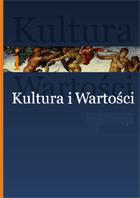Wprowadzenie: Rozumienie świata kultury z perpsektywy nauki i filozofii
Introduction: Understanding the World of Culture from the Perspektive od Science and Philosophy
Author(s): Honorata JakuszkoSubject(s): Philosophy
Published by: Wydawnictwo Naukowe Uniwersytetu Marii Curie-Sklodowskiej
Keywords: philosophy; science; culture
Summary/Abstract: The texts in this volume focus on the origin of culture, its main tendencies, as well as perspectives and challenges of the future. They examine important - ultimately unresolvable - problems posed in science and philosophy alike. Tomasz Kupś reconstructs a model of the origin of culture in eighteenth-century German philosophy which referred to the theological motif of original sin. In the interpretation of Immanuel Kant and Johann Gottfried Herder, the first act of freedom depicted in Genesis marks the beginning of the historical world of culture in which humanity acquires continuously new experiences, both positive and negative. The ambiguous character of the progress in science and technology, which favours the domination of the contemporary attitudes of hedonism and consumerism that crush human sensitivity to the tragic (irremovable) aspects of human existence are analyzed by Joanna Smakulska who turns to Bogusław Wolniewicz’s understanding of death as a phenomenon inexorably linked with religiosity or magic. In his characterization of the types of argumentation in the so-called anti-technology movements, Tomasz Łach elaborates on doubts about scientific and technological progress. A more radical thesis is developed in the article by Leszek Gawor who argues that a pro-ecological metanoia (movement from anthropocentrism to biocentrism) constitutes the necessary condition of the survival of human civilization. Joanna Kiereś-Łach warns against the dangers of the fad for coaching and opposes it to the classical ethos of a rhetorician-orator as vir bonus who realizes intellectual-moral virtues in his conduct. The articles which explore the problem of scientific cognition make up a second group of the texts in this volume. Michał Miklas reconstructs the social-axiological contexts of knowledge in the theory of Charles Sanders Peirce. Marcin Rządeczka writes of the advantages and limitations of the naturalistic conceptions of history. Anna Musioł emphasizes the distinctness of methods and functions of the humanities (Geisteswissenschaften), opposed by Wilhelm Dilthey to the natural sciences (Naturwissenschaften).
Journal: Kultura i Wartości
- Issue Year: 2012
- Issue No: 04
- Page Range: 7-7
- Page Count: 1
- Language: Polish

